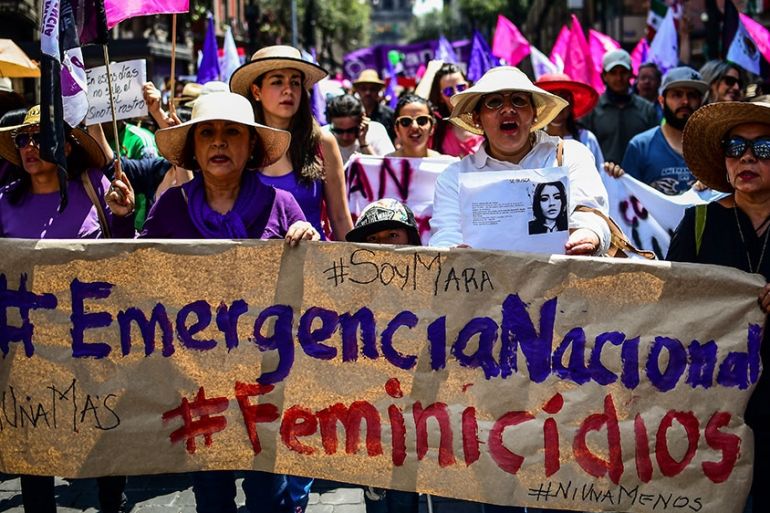Mexicans march against femicide after teen’s murder
Nineteen-year-old Mara Fernanda Castilla went missing after using a ride-hailing app in the Mexican state of Puebla.

Holding signs that read “ni una mas” (not one more) and “no fue tu culpa” (it was not your fault), thousands marched across cities in Mexico on Sunday, calling for government action against femicide after a 19-year-old was found dead after using a ride-hailing app.
The body of Mara Fernanda Castilla was found near a motel in the central Mexican state of Puebla on Friday after she went missing a week earlier.
Keep reading
list of 4 itemsNigeria’s women drivers rally together to navigate male-dominated industry
Members of London’s Garrick Club vote to let women join for first time
Why has Australia declared a ‘national crisis’ over violence against women?
In a statement, Puebla authorities said they believe she was killed by a driver from the taxi-hailing application, Cabify. She had used the app on the night of September 8 but never arrived at her destination.
The driver of the vehicle has since been arrested, and officials say he will be charged with femicide.
The news of Castilla’s death stoked anger across Mexico, prompting civil society groups, activists and community members to organise marches on Sunday in support of Castilla and other victims of femicide.
![Mara Castilla's family members march in Xalapa, Veracruz state, Mexico [AFP]](/wp-content/uploads/2017/09/4ad15326c97745629a455003185be8dc_18.jpeg)
“Sexual violence against women is constant, and it happens on a daily basis in Mexico,” Tania Reneaum, the executive director of Amnesty International Mexico, told Al Jazeera.
“We marched not only for Mara but for so many women who have been killed,” Reneaum said, referencing the recent deaths of 22-year-old Lesby Berlin Osorio in May and 11-year-old Valeria Teresa Gutierrez in June.
READ MORE: Murdering Mexican women with impunity
In the state of Puebla alone at least 83 women have been killed since the beginning of the year, according to local media.
Pointing to government statistics, Reneaum said 66 percent of women and children over the age of 15 have reported being sexually abused at least once.
‘Reclaiming space’
Martha Violante, who marched in Mexico City, said: “Femicides are a serious problem in our society since the government’s response has not been enough.”
Thousands in the capital chanted in Spanish: “They will tremble, they will shake, because machismo has got to end … Do not stop applauding, do not stop applauding, machismo must die.”
Andalusia Knoll Soloff, a journalist who also attended the Mexico City rally, said several protesters were marching for the first time.
“I think the march was less about demands and more about women exerting their rights to live their lives,” Knoll Soloff told Al Jazeera. “Thousands of women have been killed over the last few years.”
The general message was “about reclaiming space and exerting your rights as an independent woman that you should be able to live your life as you want, and not think that if you call a taxi from a secure taxi app because it’s late at night that you’re going to end up dead”, Knoll Soloff added.
Mara tomó un taxi que consideraba seguro. Le costó la vida. Hoy marchamos por ella y miles de otras Victimas de Feminicidio. #NiUnaMas pic.twitter.com/pijzue3vFt
— 𝓐𝓷𝓭𝓪𝓵𝓪𝓵𝓾𝓬𝓱𝓪 (@Andalalucha) September 17, 2017
Translation: Mara took a taxi that she thought was safe. She never made it home. Today we march for Mara and thousands of other victims of femicide.
According to Knoll Soloff, ride-hailing applications like Cabify and Uber have become increasingly popular across Mexico, especially for women.
“In Mexico, taxis are considered unsafe,” she said, adding that apps such as Uber and Cabify are considered to be “safer options” due to the data that is shared during each ride.
Tony Gali, Puebla’s governor, said in a tweet that the safety standards for Cabify would be reviewed.
Cabify released a statement on Twitter, saying that it “deeply regretted” and condemned the death of Castilla, demanding that the person responsible be held accountable.

‘Society must change’
While many who attended Sunday’s marches blamed government inaction, several also pointed to societal factors.
“It’s a mixture between impunity, corruption and macho culture,” Amnesty’s Reneaum said.
Protester Violante, who is also a journalist, said that “as a Mexican woman, it is very difficult to know that leaving your house you may not return.
“And worse, that if something does happen to you, some parts of society will blame you for ‘being a whore, and not being a decent woman’.”
READ MORE: Women fight back against sexual harassment in Mexico
Violante explained that some people who walked past the Mexico City march were heard blaming Castilla for being out late at night.
Although such mentality does exist in Mexico, however, Violante believes there is also a “cultural revolution” taking place.
“I think things are going to change, not today, but in time,” she said.
Reneaum added that as women in Mexico, “we want to feel safe, we want to feel alive and we wanted to have the public space for us too”.
![A woman holds a sign reading 'We want us alive' during the march in Mexico City [Ronaldo Schemidt/AFP]](/wp-content/uploads/2017/09/11b4895eec1c4556ac509c7827b48a7d_18.jpeg)